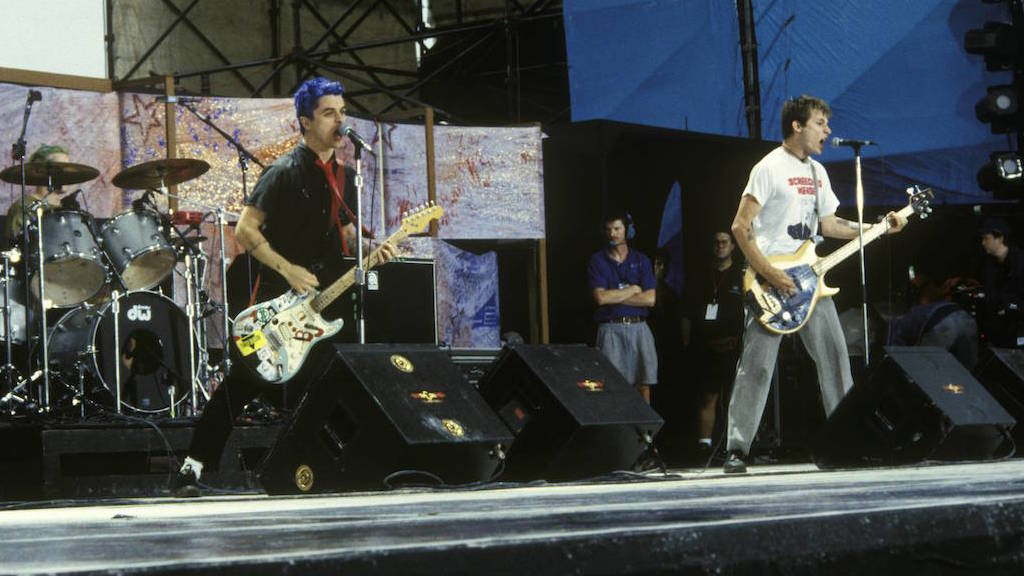When it comes to perfect couplings, punk rock and riots go together like a horse and carriage. In 1981, at The Ritz in Manhattan, Public Image Limited led their paying public into disorder by playing behind a curtain while frontman John Lydon derided the 3000 strong crowd with the taunt of “silly fucking audience.” That same year, a series of dangerously oversold shows by The Clash at the Bond International Casino saw anarchy in the USA spill out in pitched battles on the thoroughfares of Times Square.
Neither of these donnybrooks, though, can hold a candle to Green Day’s afternoon set at Winston Farm in Saugerties, New York, on Sunday August 14, 1994.
The occasion was Woodstock ’94, a three-day jamboree held to celebrate the 25th anniversary of the now legendary Woodstock festival, at which appeared The Who, Jimi Hendrix and many other leading lights of the time. A quarter of a century on, the bill featured, among others, Aerosmith, Metallica, Nine Inch Nails and Primus.
- Twenty Years Ago Today: Woodstock 1994
- Green Day – The Early Years
- Thinking Out Loud: Billie Joe Armstrong
- The A-Z of Green Day
In 1969, half a million people had been warned to stay away from “the brown acid.” In 1994, the same number of faces were met with a less avoidable threat: the weather. For three days a dishwater sky had wrung torrential and constant rain on upstate New York. By the time Green Day met their audience that Sunday afternoon, conditions were becoming untenable. Onsite, in a radio interview the Australian journalist Andrew Mueller surmised the scenario in one word: “shithouse.”
With a black shirt, a red tie and blue hair, Billie Joe Armstrong’s opening words to the crowd gathered at the festival’s South Stage were antagonistic. “What is this free fucking hippy love shit?,” he asked, adding, “How are you doing, you rich motherfuckers?”
Standing in conditions that made a wet year at Glastonbury look like a sunny day at Glynebourne , the answer was probably, “Not so great, actually.” Testy and volatile, the audience’s distemper would soon enough find its avenue of expression.
20 minutes into their 35 minute set, things began to truly slide out of control. Green Day were already having quite the summer – their Dookie album catapulting its way up the charts, crowds on the Lollapalooza tour hurdling turnstiles in order to catch their noon set – but the trio had never seen anything like this. Slogging their way through When I Come Around, the sky was brown with missiles made of mud; the stage looked like a late season non-league football pitch from 1973.
“I hope it rains so much, you all get stuck,” announced bassist Mike Dirnt, unhelpfully. 15 minutes later, when attempting to leave the stage, Dirnt would be tackled by a security guard with such force that it sheared his front teeth, an intervention that required a visit to the dentist the following day.
No fun, as Johnny Rotten would say. With the set nearing its chaotic end, Billie Joe Armstrong abandoned his guitar in favour of volleying several clumps of mud from whence they came; or, if you prefer, fighting fire with fire. Behind him, the rhythm section swerve in to a circumcised rendition of Twisted Sister’s We’re Not Gonna Take It as the audiences surges and leaps like salmon upstream.
“Look at me, I’m a fucking idiot!” announces the frontman. He might have been describing the spectators, or else referring to himself; possibly both.
Astonishingly, five years later Woodstock ’99 would prove even grimmer than its immediate predecessor – a gathering that culminated in riots, rapes and a stage set on fire. But in 1994, things were bad enough for now. Leaving behind a stage in a state of perfect destruction, Green Day were expedited from the site via helicopter, a mode of transport of which Billie Joe Armstrong was terrified. Touchingly, his second concern was that his brand new pair of black Converse hi-tops were becoming sullied by the slurry at his feet.
“Woodstock [‘94] was about the closest thing to anarchy I’ve ever seen in my whole life,” the singer would later recall, adding that “I didn’t like it one bit.”
